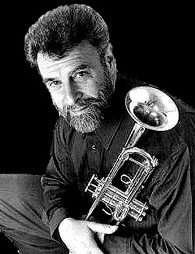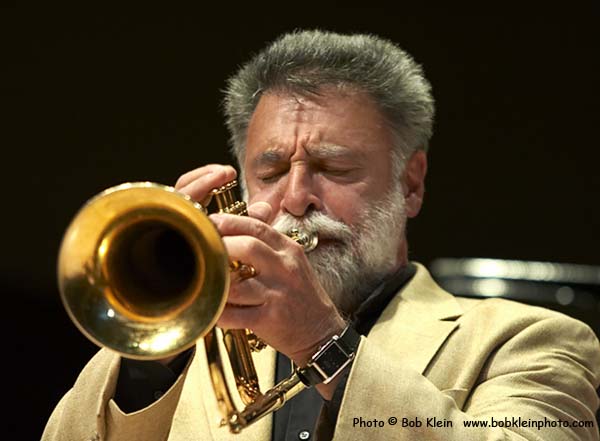Jazz
solos!
Jazz
improvisations!
What are they? How are they
done? What
is a musician thinking about when he or she plays a solo? What makes us
do what we do? Go where we go? What is it that keeps us racing up and
down
that long and wondrous road of exploration so our musical ideas remain
fresh, vital, full of energy and fire?
These are questions I am
asked frequently.
To most people, what I do as a Jazz improviser is sometimes mysterious,
often times magical.
Without taking any of that
away, I believe
I can explain what is involved in the fine art of improvisation and the
process of executing it to perfection.
In truth, improvisation is a
musical
language with which Jazz musicians converse with each other. They learn
just like everyone else who masters their native language; not from
books,
but by ear!
 How
did you learn to speak your native tongue? Did someone teach you to
speak?
No, of course not! You learned by hearing that language spoken by
people
around you, usually family members. By the time you were a year or more
old, you had begun to speak that language, and, by the time you
actually
studied the grammar and had assimilated the syntax of that language, at
approximately age eight, you had been fluent in the language for about
six years!
How
did you learn to speak your native tongue? Did someone teach you to
speak?
No, of course not! You learned by hearing that language spoken by
people
around you, usually family members. By the time you were a year or more
old, you had begun to speak that language, and, by the time you
actually
studied the grammar and had assimilated the syntax of that language, at
approximately age eight, you had been fluent in the language for about
six years!
Consider, for a moment, how
many people
have studied a foreign language in school for three or four years but
are
still unable to speak that language? Yet, if for a period of time you
were
placed among those to whom that language is native and you had to speak
that language, your ears would become attuned to it. You would quickly
develop a vocabulary and learn how to put words and phrases together in
order to speak it with ease. The longer you remained immersed in that
situation,
the more fluent and sophisticated your skills in that language would
become.
How does this apply to Jazz improvisation? And what motivates a
musician
to begin improvising?
Usually a young musician
will hear a
particular track on the radio or a CD which inspires him to grab his
instrument
and attempt to duplicate what he just heard. Initially, it takes a good
bit of time to relate what he heard to his instrument as his ears are
not
yet accustomed to this process. But as he faithfully continues this
ear-conditioning
regime, he rapidly improves his skills. In the course of learning to do
this, he constantly finds himself hearing new things he wants to try
and
play, thereby further developing his ear and adding to his musical
vocabulary.
All the while, he is learning from those who came forth before him and
established their own individual musical voices. In my experience, no
player
who has not gone through this process has ever developed into a skilled
and creative improviser! This process develops a musician's ear, and,
like
learning to talk, the player copies other people's style, articulation
and phrasing all the while exercising his or her technical abilities by
just playing the music, not focusing on his instrument.
Simultaneously, the young
musician develops
a vocabulary and learns the intricacies of the language, the phrasing,
articulations, rhythms and harmonic approaches in order to clearly
express
himself. The more he applys himself, the broader his skills become. The
more expansive his vocabulary, the more fluent he becomes in the
language.
Eventually, as he becomes impatient with imitating others, he begins to
use his recently acquired skills to put forth his own ideas and to
express
his deepest personal feelings. Sound familiar? Just like learning to
talk
and developing one's speaking skills!
Over a period of time, the
neophyte
player develops into a full-blown Jazz linguist, and, if perceptive,
realizes
this is a life-long task in which he will constantly participate in to
become more fluent, so he can enhance his musical vocabulary, find his
own highly-individualized voice, and establish a niche for himself with
his music. This is the long, and sometimes winding road he must travel
to become an articulate Jazz improviser.
What happens when four or
five musicians
come together to play?
What happens within their
'conversation'?
 Quite simply, it is a 'call
and response'
to each other. What each musician plays elicits, in a millisecond, a
response which then triggers further 'dialogue' from his colleagues,
each
in their own way throughout the entire piece. All of this is based on
the
musician's thorough knowledge of his subject matter, or, in this case,
the tune he is playing.
Quite simply, it is a 'call
and response'
to each other. What each musician plays elicits, in a millisecond, a
response which then triggers further 'dialogue' from his colleagues,
each
in their own way throughout the entire piece. All of this is based on
the
musician's thorough knowledge of his subject matter, or, in this case,
the tune he is playing.
Apply this to people talking
together
in which they exchange thoughts and ideas based upon their knowledge of
a specific subject. In conversation, the more one speaks with others
the
more they absorb and expand upon the knowledge and ideas of others. As
they attempt to educate themselves and refine their own skills of
communication,
they, in turn, become better speakers with greater abilities to listen,
respond, converse. This is the same process we use to become articulate
improvisers except that we use our instruments! Of course, we can only
improvise to the level of mastery we have acquired on our instruments,
a step not required in conversation.
Now having developed into a
skilled
Jazz improviser, one who has trained his or her ear and learned the
theories
of harmony and rhythm, how does one develop a solo?
In my case, I first listen
to the style
and context of the music, then immerse myself into the feel of the
rhythm
and harmony and let that elicit a response from me. In a big band
context,
I listen to how the arranger has structured the setting into which I am
being placed, the textures of the sounds around me, and then, based on
the harmonies and rhythms, try to create my own melodic lines
initiating
a conversation with the orchestra while continually striving to find
something
original and new. In the process, I respond to all that surrounds me,
the
manner in which the rhythm section 'comps' underneath me, the
backgrounds
the arranger has written to accompany me and what the tempo, rhythm and
style of the composition suggest to me. I try to create a discourse
with
the group I am within and say something expressive and musically
appropriate.
In a small group, I'm less
restrained,
free of written frameworks which enables me to be more spontaneous in
style,
tempo, rhythm and harmonies. Also, if I desire, I can change the 'feel'
and setting of the piece. For instance, I can play a composition in
Bossa
Nova style one evening and the next evening play it in a 'swing' style.
Even if they continue to play a piece in the same style, most creative
Jazz musicians strive not to be repetitive. They are always searching
for
new ways to express themselves and expand their ideas and skills of
communicating.
In closing, it is difficult
to put into
words what prompts someone like myself to play in a specific way at a
specific
time because I play extemporaneously, just as we talk
extemporaneously.
Do we think about
speaking?
Or, isn't our speaking
dictated by the
situation at hand and based on our need to respond to that situation by
expressing our own ideas and thoughts, which then creates a dialogue
with
those who elicited that response.
Jazz improvisation, like
speaking, is
just that. Even more.
It is the eternal search for
the holy
grail of creativity which permits us to weave a musical mosaic of
incredible
beauty, power and symmetry unlike anything that has gone on before!